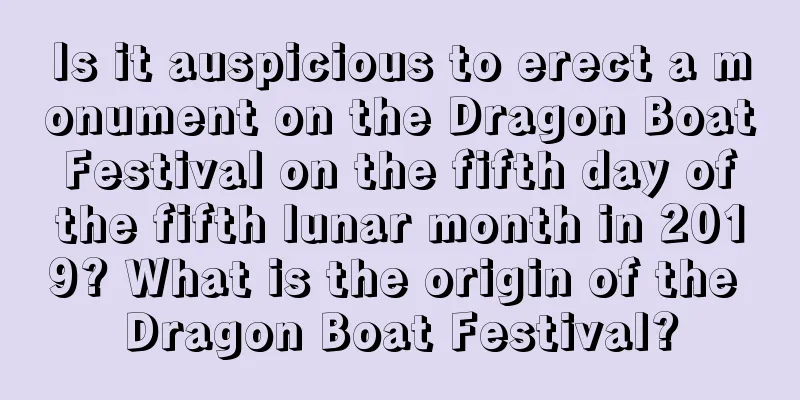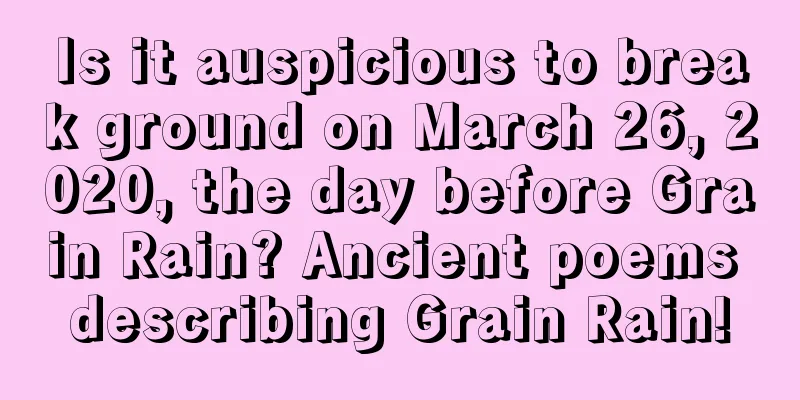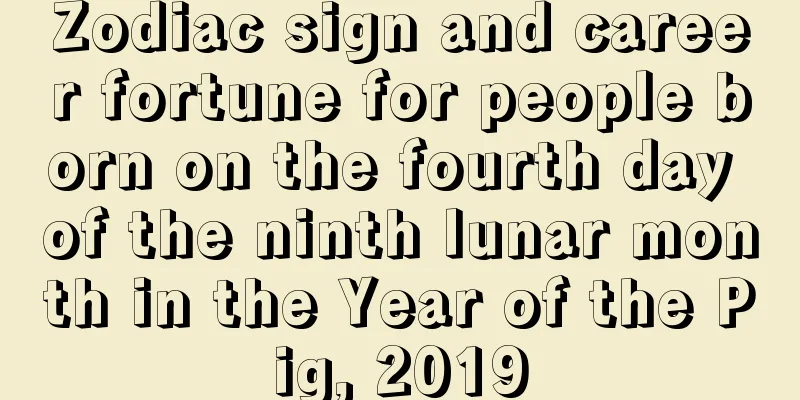Is it auspicious to erect a monument on the Dragon Boat Festival on the fifth day of the fifth lunar month in 2019? What is the origin of the Dragon Boat Festival?

Introduction: Erecting a monument is also an important matter, so an auspicious day must be chosen for erecting the monument. So is it auspicious to erect the monument on the Dragon Boat Festival on the fifth day of the fifth lunar month in 2019? What is the origin of the Dragon Boat Festival? The fifth month of the lunar calendar is midsummer. The lotus breeze delivers fragrance, the bamboo dew drops make clear sounds, and the scenery is different from any other season. Please continue to pay attention to Mr. Shui Mo's website for more content related to the fifth month of the lunar calendar in 2019!Is it auspicious to erect a monument on the Dragon Boat Festival on the fifth day of the fifth lunar month in 2019?2019 lunar calendar Dragon Boat Festival calendar query:Lunar calendar year 2019, May 5th dayFriday, June 7, 2019 Gemini (solar calendar) 【Today’s lunar calendar is suitable】 [Do not use Yang Gong’s death anniversary for important events] Pray for blessings, get married, set up the bed, build the stove, accept the bride price, recruit a son-in-law, fast and offer sacrifices, pray for offspring, seek wealth, build meridians, build houses, dig wells, plant, raise beams and erect pillars, capture [Today’s taboos in the almanac] [Do not use Yang Gong’s death anniversary for important events] Open the market, establish securities, collect money, ship goods, collect livestock, move into new homes, separate, have a fire, travel, break ground, hold funerals, bury, place incense, open positions From the above almanac content, we can know that the Dragon Boat Festival on May 5, 2019 belongs to [Yang Gong’s death anniversary, do not use it for important events], so today is not a suitable day to erect a monument! What is the origin of the Dragon Boat Festival?Legend of the Dragon Boat Festival: Qu Yuan died for his country by jumping into the riverThe original origin of the Dragon Boat Festival is related to Qu Yuan. According to the "Biographies of Qu Yuan and Jia Sheng" in "Records of the Grand Historian", on the fifth day of the fifth lunar month in 278 BC, Qu Yuan, a minister and patriotic poet of the Chu State, heard the news that the Qin army had broken through the capital of the Chu State. He was filled with grief and indignation, and his heart was broken. He resolutely wrote his last work "Huai Sha", hugged a stone and jumped into the Miluo River, dying for his country. After Qu Yuan's death, the people of Chu State were extremely sad and flocked to the Miluo River to pay tribute to Qu Yuan. And throw rice dumplings into the river to prevent fish and shrimp from eating his body. From then on, on the fifth day of May every year, there was a custom of dragon boat racing, eating rice dumplings and drinking realgar wine to commemorate the patriotic poet Qu Yuan. Legend of the origin of the Dragon Boat Festival: Wu Zixu committed suicide to show his loyalty It is widely circulated in the Jiangsu and Zhejiang areas, and is said to be to commemorate Wu Zixu of the Spring and Autumn Period. His father Wu She was killed by King Ping of Chu. Later, Zixu turned to the light and fled to the State of Wu, helping Wu to attack Chu. After five battles, he entered the capital of Chu, Yingcheng. In 506 BC, Xu led his troops to capture the capital of Chu, dug up the tomb of the King of Chu, and whipped the corpse 300 times to avenge his father and brother. However, King Fuchai believed the slander and gave Zixu a sword and ordered him to commit suicide. Zixu was a loyal man and was ready to face death. Before his death, he said to his neighbors, "After I die, dig out my eyes and hang them on the east gate of Wujing, so that I can watch the Yue army enter the city and destroy Wu." Then he committed suicide. King Fuchai was furious when he heard this, and ordered Zixu's body to be taken, wrapped in leather and thrown into the river on May 5th. Therefore, it is said that the Dragon Boat Festival is also the day to commemorate Wu Zixu. Legend of the Dragon Boat Festival: Cao E saved her father by jumping into the river This is to commemorate the Eastern Han Dynasty filial daughter Cao E who jumped into the river to save her father. Cao E was a native of Shangyu in the Eastern Han Dynasty. Her father drowned in the river and his body was missing for several days. At that time, the filial daughter Cao E was only fourteen years old and she cried along the river day and night. Seventeen days later, on May 5th, he also jumped into the river and carried out his father's body five days later. This story was passed on to the county governor, who ordered Du Shang to erect a monument to commemorate Cao E's filial piety. The origin of the Dragon Boat Festival: May 5th is a day of worship May 5th is the day for sacrifice. The ancients believed that May 5th was an evil month and an evil day, and that babies born on May 5th, whether male or female, could not be raised to adulthood. Once raised, boys will harm their father and girls will harm their mother. There are even sayings such as "If you take office in May, you will not be promoted even if you are exempted from office" and "Building a house in May will make you bald". Therefore, sacrificial activities must be held on May 5th every year to eliminate plague, drive away evil spirits and pray for good luck. As a result, related cultural activities emerged, forming the distinctive Dragon Boat Festival. What is the meaning of the five-colored ropes of the Dragon Boat Festival?Tying colorful strings for children is an important custom of the Dragon Boat Festival, which has the beautiful meaning of praying for good luck.The custom of tying colorful ropes during the Dragon Boat Festival originated in the Han Dynasty and has remained popular to this day. People regard the five-colored rope as a "five-colored dragon". The Dragon Boat Festival is also called "Children's Day". May was called the poisonous month by the ancients. Tying five-colored ropes on the Dragon Boat Festival is meant to protect children from demons and evil spirits. The five-colored rope washed away by the water will turn into a little dragon and take away the bad things from your body. In this way, all worries and sorrows will flow away with the rain, bringing you good luck for the whole year. During the Dragon Boat Festival, people weave colorful silk threads into ropes and hang them around children's necks to ward off evil spirits. The ropes are called "longevity ropes". It is also known as "life-extending thread", "war-avoiding silk", "five-color silk", "longevity thread", etc. In ancient times, May was considered an unlucky month because its weather was hot and diseases were prone to spread. Since the Han Dynasty, people have tied colored silk threads on their arms around the fifth day of this month. It is said that this can ensure safety and health, and also avoid disasters such as war. Wearing colorful threads during the Dragon Boat Festival is very particular. Colorful thread is made of five colors of thread. Your horoscope has secretly arranged your love luck information. In order to stop struggling for love, quickly click on the "Premium Calculation" below for advance predictions. I wish you can find the right one soon! |
Recommend
Is it good for people born in the Year of the Sheep to be born at the beginning of spring? What is the personality of people born in the Year of the Sheep at the Beginning of Spring?
Introduction: The Beginning of Spring is one of th...
Can I move and live in a new house on the fifth day of the fifth lunar month in 2020?
Can I move and live in a new house on the fifth d...
Is New Year's Day a traditional Chinese festival? When is it?
China is a country with a long history and a profo...
Is the twelfth day of December 2019 suitable for seeking offspring?
Is the twelfth day of December 2019 suitable for s...
Is the 26th day of the ninth lunar month in 2018 suitable for praying?
Is the 26th day of the ninth lunar month in 2018 s...
Is it okay to get married on the 24th day of the twelfth lunar month in 2020? What day is the 2021 Southern Chinese New Year?
Introduction: Marriage is one of the important mat...
Is the fate of a girl born on August 18, 202 in the lunar calendar good? Girl's fate analysis
The fortune of a girl born at different times is d...
Is the Great Cold in 2019 a good day? Is it an auspicious day?
The Great Cold is the coldest time of the year. At...
Is it a good time to travel on the tenth day of the ninth lunar month in 2018? How is your travel fortune?
The reason for choosing an auspicious day to trave...
Is the 2019 Chinese Valentine's Day an auspicious day for sacrifice? What kind of festival is the Chinese Valentine's Day?
Introduction: Generally, an auspicious day must be...
What day is August 23rd in the lunar calendar in 2022? Can we worship our ancestors?
Since ancient times, China has had the custom of w...
When is Singles’ Day in 2021? What is the meaning?
Singles' Day is an entertaining festival popul...
Can I celebrate my tenth birthday on the Spring Equinox? Can I hold a birthday party on the Spring Equinox in 2022?
Many people are born every day, so many friends ha...
Is it a good time to start renovation on the second day of the tenth lunar month in 2017?
Introduction: Houses have become a necessity in pe...
Is it good to have rain on the Autumnal Equinox in 2018? Is there any saying about rain on the Autumnal Equinox?
Introduction: The Autumnal Equinox is one of the 2...









